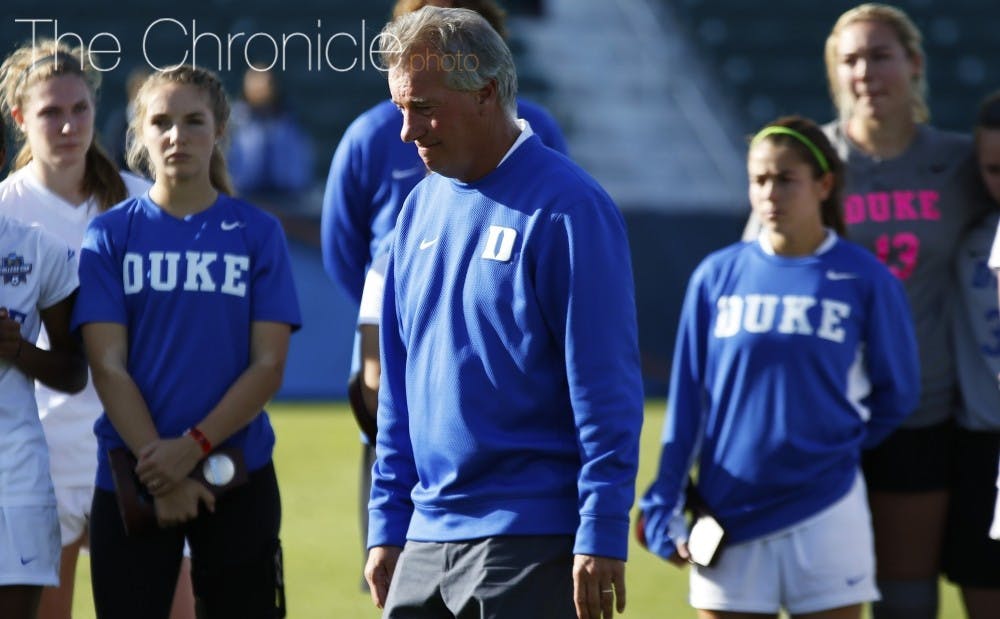Twenty years, 256 wins, 18 NCAA tournaments, 3 College Cups, 2 regular-season ACC titles and at least 15 alumni in the pros.
Robbie Church has been the head coach of Duke women's soccer for two decades, inheriting a team known for solid consistency and developing it into an undisputed top-10 program in the nation. Under Bill Hempen, Church's predecessor, the Blue Devils were the 1992 runners-up, and made it to the Sweet Sixteen just once in the four years after the tournament expanded to at least 32 teams in 1996. Church's Blue Devils matched that in his first four years, and their 2009 and 2010 recruiting classes kicked off a decade that would see Duke suddenly vault itself into the elite tier of collegiate women's soccer.
Now, despite Church embarking on his third decade in Durham, he doesn't see his coaching as having ever changed much.
“I don't think [my approach has changed],” Church said. “Maybe more duties I have to do as a head coach, or things pull me away from the soccer part that I used to do a little bit more of. [But] I don't really think there's been a lot more. I think we've delegated our duties better, I think we've split up our duties. And I think we've got really good people in there that are very knowledgeable, and we play to their strengths.”
Church is nothing if not understated when talking about himself. The man former Chronicle women’s soccer beat and current Business Insider sports reporter Meredith Cash told the Chronicle is “the Ted Lasso of NCAA women’s soccer”—on account of his wholesomeness, not his knowledge of the sport—always defers praise to his assistant coaches and roster. To himself, Robbie Church is simply a delegator. Others are less reserved in their praise.
“Robbie sets the tone by having a deep care for every player on the roster. And I think that comes across in his recruiting, and I think the girls we end up getting on this team come from families that have deep value in having a coach that coaches the person first,” forward Tess Boade said.
As with any good head coach, Church’s imprint on Duke is apparent. On the field, there’s the team’s lockdown backline and impenetrability on counters—though Church is quick to attribute that to assistant coach Carla Overbeck—and the emphasis on corner kicks and the constant shifting of formations.
“Every game we ever have, before we even take off on the plane or start on the bus ride, every single one of our coaches has the film up, and I think they probably watch every game 10 times over, just because they're so committed to, ‘How can we get better incrementally here and there,’” Boade said.
Off the field, there’s a level of trust Church has in his players rarely found elsewhere. Last fall, in the height of collegiate teams across schools and across sports struggling to keep their players together and COVID-free, Church never established any specific team rules against parties or hanging out with other teams, according to Boade. He trusted the players cared enough about their season not to risk it.
The 2020 team never had a player miss a game to COVID-related protocols.
After losing to Florida State in the Elite Eight, Church had the option of keeping players in Durham for offseason training, as many top programs do. He opted to send them home, for a layoff Boade called “the perfect amount of break.” It was a decision that required him believing everyone would be able to come back in shape.
The 2021 team’s preseason fitness testing scores were the highest ever.
“I think that our coaches were really great once the season ended, and they said ‘You know what, you guys need a break. You need at least a couple weeks to a month off. And just don't even think about soccer. Go have fun, go try to enjoy your summer,’” centre back Caitlin Cosme said. “They knew that if we had just kept going, we would have been totally burnt-out by the time preseason came.”
At his core, that caring figure is who Robbie Church is. There’s different ways to see the man spearheading a staff that is, in his words, “on the cutting edge of soccer, of developments that are out there across the world.” He changes players’ positions and the team’s formations every year in order to win, but he and the assistant staff (including Overbeck, Kieran Hall and Lane Davis) put as much work as they do into research and developing new strategies because they know they need to earn their players’ trust first.
But what stands out about Church is how he “puts his players first and that he's like their goofy uncle or something,” as Cash put it, and most importantly how that attitude extends to every player on the roster.
“I think a lot of it is communication, trying to be upfront, and trying to be honest with them. It hurts sometimes, but you don't want to see anybody disappointed,” said Church.
“No matter if you're playing, if you're not playing—[the coaches] make sure you know that you are just as important and you always have a role and don't you dare think that you don't have a role, because you most certainly do,” centre back Emily Royson said.
She likes playing for a coach that cares as much about his players on the field as he does off.
"[Church] gives us this feeling that we really are a family," Royson said.
Get The Chronicle straight to your inbox
Signup for our weekly newsletter. Cancel at any time.

